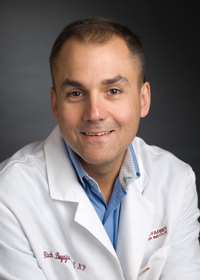In celebration of Living Proof week, Insight honors cancer survivors with daily posts about survivorship.
When I was discharged from the hospital in 1996 after undergoing a stem cell transplant to treat leukemia, I was terrified.

Yes, I’d survived cancer treatment, but now I had to deal with something even scarier: the unknown.
If you’ve recently ended active treatment and are entering the world of survivorship, here are some tips to keep in mind.
It’s OK to feel isolated at first. The end of cancer treatment can bring negative emotions, particularly when those around you think you should be “getting back to normal.” Leaving the safety net of regular treatment visits can feel like abandonment.
It can create a sense of isolation – as if you are on a desert island, alone except for your negative feelings, and afraid to tell anyone because you don’t want to disappoint them. Remember that each one of us has experienced something like this, and it’s okay to talk about these feelings with your loved ones and your health care team.
Expect new challenges. My friend Amy Grose, MSW, LICSW, a social worker at Dana-Farber, will tell you that every survivor faces daily challenges, such as: feeling scared the cancer is going to come back; trying to make ends meet financially while on disability; dealing with physical complications from treatment; having your relationship with your partner change; and feeling depressed or even having panic attacks. These obstacles – and others – are completely normal, and it’s important to know that they may arise. Talk with your health care team — you don’t need to go it alone.
Stay in touch with your primary care provider (PCP). One of the worst things you can do is lose touch with your PCP during or after cancer treatment. When I was being treated, I didn’t see my PCP for a few years and thus missed a number of needed screening tests.
Survivors often make the mistake of assuming their oncologist is an expert in preventive medicine because he or she is an expert in cancer. But oncologists are specialists and often not up to date on how to best manage general health problems.
When your treatment ends, you’ll spend less time with your cancer care team and your PCP will become more important.
Take steps to deal with fatigue. Fatigue in cancer survivors (and patients) can have many causes, ranging from medication regimens, lack of exercise, treatment side effects, and even depression or anxiety. It’s a complicated issue often caused by more than one factor. You may be experiencing fatigue if you feel tired in the morning, even after a good night’s sleep, or having trouble getting to sleep or waking up early. Talk with your doctor to find potential causes and solutions.
Take control of your health. Weight, exercise, and diet: These three words represent the best ways you can improve your health; nothing else can do as much. What many survivors don’t know is that if you maintain a healthy weight, eat right, and get regular exercise, you can possibly change your future for the better. You may actually reduce the risk of relapse in certain cancers. It also can reduce the risk of treatment-related toxicity and future health problems.
You may actually reduce the risk of relapse in certain cancers. It also can reduce the risk of treatment-related toxicity and future health problems.
I recommend meeting with a certified nutritionist and an exercise physiologist who specializes in helping cancer patients and survivors. Remember, you’ll first need to check with your doctor to make sure it is okay for you to diet or participate in an exercise program.
Don’t be afraid to talk about your fears. Survivors often describe living between checkups, waiting to make sure their cancer has not recurred and only relaxing when the visit to the oncologist is over. But then they start the cycle again by focusing on the next visit. The fear of recurrence is perhaps the most scary thing a survivor faces. It is also a very normal reaction to an abnormal situation. I found trying to ignore this emotion only made it worse for me, because I was trying to figure it out on my own, without help from others.
The best advice I can give you is to take your emotional health as seriously as you do your physical health. Survivors spend so much time focused on every physical issue (rightfully so) and reporting this to their doctor in order to first better understand the issue and second to get some relief. But it’s equally important to tell your health care team about fears or other emotional issues you’re having. Remember, you’re not in this alone, so reach out for a helping hand when you need it.
Richard Boyajian, RN, MS, ANP, is an oncology nurse practitioner in Dana-Farber’s Adult Survivorship Program, a member of the LIVESTRONG Survivorship Center of Excellence Network.

A beautifully written and insightful post. This would make an excellent brochure or booklet and should have a permanent place on the Survivorship website.